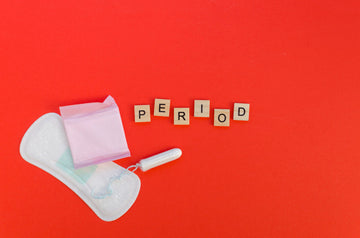Endometriosis symptoms are a continual condition wherein the tissue, just like the lining of the uterus, grows outside the uterus, inflicting acute pain, heavy bleeding, and soreness, specifically during periods. For women living with endometriosis, managing menstrual symptoms isn't always the most effective way to find comfort. It's miles more important to maintain a good work-life balance. Choosing the right sanitary pad or products plays a vital role in decreasing irritation, warmth, and pain during menstruation. Many girls with endometriosis wonder whether or not sanitary pads could make their symptoms worse. With issues regarding plastic materials and chemical threats, it's essential to understand, and switching to safer options can help alleviate some of the pressure.
What is Endometriosis?
Endometriosis is a condition wherein the tissue, similar to the uterine lining, grows outside the uterus, frequently around the ovaries, fallopian tubes, or pelvic area. This tissue responds to the menstrual cycle, causing swelling, pain, and occasionally, frightening symptoms.
Women with endometriosis symptoms commonly experience extreme cramps, continual pelvic pain, period fatigue, and heavy periods. During menstruation, the pelvic region becomes highly sensitive and inflamed, making even normal period symptoms feel more intense. Managing comfort during this time is especially important for those living with endometriosis.
How do Menstrual Products Affect Endometriosis?
Menstrual products can significantly affect how women with endometriosis symptoms manage their symptoms. During periods, whilst the ache and sensitivity increase, some products mainly made with synthetic substances can cause inflammation, friction, or warmth buildup. Constant changes due to heavy bleeding can also cause pain. This is why it is important to pick the proper menstrual product. Opting for breathable, chemical-free, and gentle options can help reduce irritation, support hygiene, and make periods more manageable for those living with endometriosis.
Why Sanitary Pads Might Feel Uncomfortable
Friction and Pressure
Sanitary pads may be rubbed against sensitive skin, mainly across the pelvic area. For women with endometriosis symptoms, even mild friction or pad stress from pads can accelerate existing pelvic pain, making it tough to transport or sit for a long time at any point of menstruation.
Increased Frequency of Changes
Heavy bleeding as a result of endometriosis may require frequent pad changes, frequently every 2-3 hours. This constant desire for change can be worrying, especially in public locations, at night, or during work and travel, resulting in soreness and mental fatigue throughout the day.
Heat and Moisture Build-Up
Pads made with plastic layers tend to trap heat and moisture around the vaginal area. This warm, wet environment can increase itching, rashes, and irritation, causing periods to be more uncomfortable for women who already suffer from inflammation due to endometriosis symptoms.
Are You Staying Clean and Comfortable?
It is essential to maintain proper hygiene throughout the period, especially for women with endometriosis symptoms. Frequent changes of pads help to prevent contamination, rashes, and skin irritation due to moisture and prolonged contact with blood. It is vital to gently wash the outer genital area with plain water, avoiding harsh soaps or intimate washes that could disrupt the normal vaginal pH balance. Additionally, the use of unseen products reduces hypersensitive reactions and the chance, which helps to keep the intimate place smooth, calm, and more cushty menstruation.
Alternative Menstrual Products for Better Comfort
Menstrual Cups
The menstrual cups offer multiple benefits, are made up of medical-grade silicone, and may be worn for 12 hours, lowering the need for frequent modifications. They sit down internally and do not experience external friction, making them a less stressful option for some ladies with endometriosis who are snug using internal menstrual products.
Period Panties
Heavy bleeding as a result of endometriosis may require frequent pad changes, frequently every 2-3 hours. This continuous want for change can be worrying, mainly in public locations, at night, or throughout work and journey, soreness and fatigue throughout the day.
Plant-Based or Organic Pads
Pads fabricated from plastic layers retain warmth and moisture in the vaginal area. This warm, wet environment can increase itching, rashes, and irritation, causing periods to be more uncomfortable for women who already suffer from inflammation due to endometriosis.
Tips to Choose the Best Product
|
When to Consult The Doctor?
If you are having problems dealing with the signs of endometriosis or finding the proper menstrual product, it's vital to consult with a gynecologist. They can help alleviate your condition, provide scientific guidance, and recommend hygiene practices tailored to your needs. Personal guidance is not the simplest way to improve physical rest, however, it also supports average menstrual health and overall well-being throughout your life.
Conclusion
Sanitary pads do not cause endometriosis, but they are able to increase pain for some women, particularly pain, heavy bleeding, or skin sensitivity. Managing endometriosis is deeply individual, and menstrual products must consider alternatives that your body seems to be most comfortable with and beneficial. Factors consisting of hygiene, product materials, and individual symptoms play a role in all period care. While a few pads may choose, others might also get higher alleviation with menstrual cups, disposable underwear, or plant-based options. It is ok to discover various merchandise until you match your needs. If menstrual pain is extreme or difficult to control, consulting a healthcare professional can provide auxiliary guidance and improve your overall menstrual health and welfare.
FAQ’s:
Can Switching Menstrual Products Help Ease Endometriosis Symptoms?
Yes, using gentler options such as a menstrual cup, organic pads, or period underwear can reduce friction, irritation, and pressure; some women feel more comfortable during endometriosis flare-ups.
What Worsens Endometriosis Symptoms?
Symptoms can worsen due to hormonal imbalance, stress, swelling, sleep deficiency, poor diet, or irritable menstrual products that increase pelvic discomfort, pressure, or skin sensitivity.
How Do You Stop Endometriosis From Progressing?
Progress can slow down with hormonal treatment, anti-inflammatory diet, regular exercise, stress management, and initial medical intervention. Regular follow-up with a gynecologist is essential for proper management.
How Can I Shrink My Endometriosis Naturally?
Natural methods include an anti-inflammatory diet, reducing red meat consumption, increasing omega-3 fatty acid intake, managing stress, engaging in regular physical activity, and utilizing natural treatments, as well as consulting with a doctor.
Why Do Some Women With Endometriosis Experience Discomfort While Using Pads?
Pads can cause friction, trap heat, or contain irritants, which can exacerbate pain and sensitivity in women suffering from endometriosis, especially during heavy flow or provisions.





